LESSON : 9
زمان آینده ساده : این زمان نشان دهنده کاری است که در زمان آینده انجام خواهد شد.
|
قید زمان آینده + ........ + will + فاعل |
سوالی و منفی کردن جملات در زمان آینده :
الف : سوالی کردن : برای سوالی کردن جای فعل کمکی (will) را با فاعل جمله عوض می کنیم.
ب : منفی کردن : برای منفی کردن به (will) کلمه (not) را اضافه می کنیم.
مثال :
1. Will they practice English tomorrow?
Yes, they will practice English tomorrow.
2. Her brother will drive to work next Sunday.
Her brother will not (won"t) drive to work next Sunday.
نکته مهم :
will not => won"t
قیدهای زمان در زمان آینده :
فردا tomorrow =
جمعه آینده = next Monday
LESSON : 8
قید حالت: نشان دهنده حالت و چگونگی انجام کاری است و به سه شکل زیر از صفات درست می شود.
الف: با اضافه کردن (ly) به آخر بعضی از صفات.
مثال : => slowly slow + ly
carelessly => careless + ly
easy + ly => easily *
ب : یکی از قیدها بی قاعده می باشد.
مثال : well => good
ج : دو قید نیز وجود دارد که شکل آنها مانند صفتشان است.
مثال : hard => hard
fast => fast
فرق صفت با قید : قید ها معمولا" در آخر جملات بکار می روند ولی صفات در وسط جملات آورده می شوند.
مثال : (adj) My father is a hard worker.
My father works hard. (adv
|
ABCPoem |
||
|
|
A is for Allah |
|
|
|
Lord of the Universe, who is One,
|
|
|
|
B is for Bilal |
|
|
|
Bilal is that tall, brave African man,
|
|
|
|
C is for Children |
|
|
|
Black, white, red, yellow, and brown,
|
|
|
|
D is for Du"a |
|
|
|
Remembering Allah all nights and days, |
Questions
- Simple questions
- Interrogative adverbs ("how?", "when", "why?", etc.)
- Interrogative pronouns ("who", "whom", "what", etc.)
- "Which", "which one"
Simple questions
Simple questions (that is, questions to which one can respond by a simple "yes" or "no") may be formed in three different ways:
1. "Do": one precedes an assertion with "do" or "does" (or "don"t" or "doesn"t" for a negative expression, or "did", "didn"t" for the past):
- Do you want to go to the movies?
- Does she work at IBM?
- Don"t you travel quite a bit?
- Do they answer questions quickly?
- Didn"t they want to eat?
But: One never places "do" or "does" before the verb "to be" or before modal verbs in questions; in this case it is preferable to invert the subject and verb:
- Are you coming to the reception?
- Was the meeting boring?
- Weren"t you hungry?
2. Inversion: with certain verbs (especially the verbs "to be", "to do", "to have", and modal verbs) questions are formed by inverting the subject and . (In the case of the verb "to have," which is usually combined with "do" in interrogatives, inversion signals a literary style.)
- Is Jack home?
- Have you nothing to declare?
- Would you like to go to the movies?
- Will they ever come to visit?
- Can the employees talk to the boss?
- Won"t you sit down?
3. Modal phrases: If a modal verb is used in a sentence, or if it is strongly implied, a modal phrase can be used to make an interrogative form. The modal phrase is typically an inversion of the subject and verb, in the negative, repeated at the end of the sentence:
- It"s time to go, isn"t it?
- He"d like to come with us, wouldn"t he?
- You would like to go with us, wouldn"t you?
- You can understand that, can"t you?
In the case of a negative question, the modal phrase would be in the affirmative:
- You wouldn"t want to try it, would you?
- She won"t be back, will she?
In the Yard
 |
 |
 |
 |
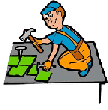 |
| The boy is watching his father cook steaks on the grill. | The invisible woman in her bikini. | Planters full of flowers are on the patio. | He is having a difficult time pulling out the weed. | The worker is nailing new shingles on the roof. |
Yards, the grassy areas (usually) of land around houses in the United States, are used for a variety of activities. Some people take pride in having the neatest, cleanest, most weed-free yard in the block, making their yards a place for work and effort. Other people use their yards as a place for fun and entertainment by putting swing sets, sliding boards, sand boxes, patios and maybe swimming pools in them. For still other people, a yard is mainly an area around their house for storing things they don"t know where else to put: boats, old cars, bicycles, wagons, broken appliances, and so on. Most people, however, are somewhere between these examples. They mow their grass and do some trimming, but do not get upset if the yard is not always perfectly neat. Their children play in the yard sometimes and may have some play equipment, but are just as likely to go to a friend"s house or to the park to play. There may be an bicycle with a flat tire leaning against the garage along with an old car tire and a couple of rusty buckets, but they are out of the way so it doesn"t look too bad.
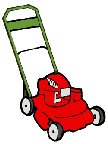 |
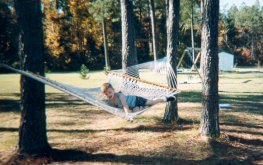 |
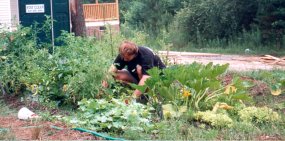 |
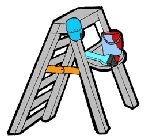 |
| Many people use gasoline-powered lawnmowers. | It is relaxing to lie in a hammock. | Weeds grow better than vegetables in most gardens. | This is a folding stepladder. |
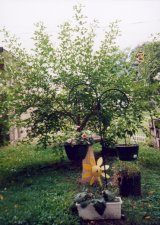 |
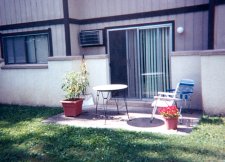 |
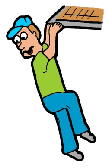 |
 |
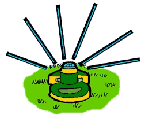 |
| This yard has a tree, some planters and a lawn ornament. | This is a neat, petite patio. | This man was careless while he worked on the roof. | This looks like a snow shovel. | A lawn sprinkler keeps the grass green in the summer |

این کتاب در واقع برای نوجوانان نوشته شده است تا به کمک شعر و ترانه و تصاویر کارتونی بامزه با مفهوم قید در زبان انگلیسی آشنا شوند و آن را برای همیشه در ذهن خود ثبت نمایند. برای تشخیص سادهی قیدها ، آنها را با حروف رنگی مشخص کردهاند و کلمات کلیدی نیز در هر صفحه به تصویر کشیده شدهاند. به عبارت دیگر به غبر از این کتاب هیچ روش بهتری برای یاد دادن کاربرد قید در زبان انگلیسی پیدا نخواهید کرد و در عین حال متوجه خواهید شد که تدریس زبان انگلیسی چقدر میتواند مفرح و سرگرمکننده باشد.
این کتاب در قطع پیدیاف و 33 صفحه در حدود چهار و نیم مگابایت حجم دارد و برای دریافت آن کافی است به ادامهی متن تشریف ببرید. برای بازدید از غرفهی این کتاب نیز میتوانید از آمازون بازدید فرمایید...




